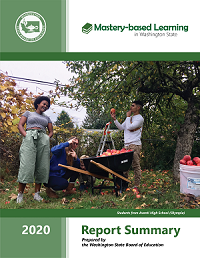Release Date:
The legislatively-mandated Mastery-based Learning Work Group has released its 2020 report showcasing recommendations for implementing mastery-based education in Washington classrooms. The following is an introductory message from the Work Group. 
Imagine a classroom you’ve been in, either as a student or visitor, where all the students were engaged and excited about what they were learning. Now imagine every Washington student could experience that feeling, in every class.
The Mastery-based Learning (MBL) Work Group looked for ways to increase student access to relevant and robust mastery-based academic pathways aligned to personal career goals and postsecondary education. The Work Group also reviewed the role of the High School and Beyond Plan (HSBP) in supporting mastery-based learning.
School looks very different today than it did when the MBL Work Group began our journey—due to COVID-19 and the reckoning our country is undergoing as we grapple with our historical and present-day structural racism. The Work Group members believe that Washington has both an opportunity and an imperative to respond to this dual pandemic of COVID-19 and the structural racism that our school system has never effectively addressed.
Our collective “why” calls for a transformation of our education system to close both the opportunity gap and resulting achievement gap. The recommendations of the Work Group are described in a report to the Washington State Legislature, and summarized in a graphic brief.
To every student who has ever felt invisible, we dedicate this work to you. We will not stop fighting until school becomes a safe place to explore, be accepted and appreciated, and to practice thinking critically—the place where you discover yourself and learn all you need to reach your dreams.
What is Mastery-based Learning?
A student’s learning happens differently for each subject and that learning does not need to happen only in a classroom. Mastery-based learning shifts the focus to the educational needs and interests of each individual student. Through an MBL approach, the education system values the knowledge and skills students already have and engages students through their diverse cultures and communities; students are also supported through authentic relationships with educators to experience rigorous and personally relevant coursework. In MBL:
- Students advance upon demonstrated mastery of content;
- Competencies include explicit, measurable, transferable learning objectives that empower students;
- Assessments are meaningful and a positive learning experience for students;
- Students receive rapid, differentiated support based on their individual learning needs; and
- Learning outcomes emphasize competencies that include application and creation of knowledge along with the development of important skills and dispositions.
Learn more about why MBL is needed in our state, and find stories from students, educators, and districts in the 2020 report summary, released December 1.
Resources

